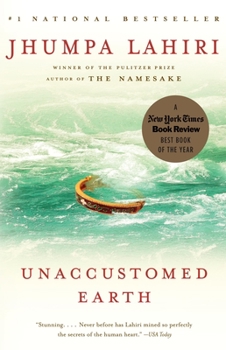Unaccustomed Earth
Select Format
Select Condition 
Book Overview
#1 NATIONAL BESTSELLER - From the bestselling, Pulitzer Prize-winning author of Interpreter of Maladies These eight stories take us from Cambridge and Seattle to India and Thailand, as they explore the secrets at the heart of family life. "Glorious.... Showcases a considerable talent in full bloom." --San Francisco Chronicle
In the stunning title story, Ruma, a young mother in a new city, is visited by her...
Format:Paperback
Language:English
ISBN:0307278255
ISBN13:9780307278258
Release Date:April 2009
Publisher:Vintage
Length:352 Pages
Weight:0.60 lbs.
Dimensions:0.8" x 5.3" x 7.9"
Customer Reviews
7 ratings
A slow-burning page turner
Published by mikayakatnt , 2 years ago
A collection of compelling and emotional short stories.
Disclaimer: I have not read any of Jhumpa Lahiri's books before but I have seen the Namesake film. So my review may be biased.
Most of the stories in Unaccustomed Earth are unrelated yet compelling. Every story delves into a particular flaw or conflict that pulls on one's heart strings. Though the stories tend to revolve around the lives of Bengali Americans, many will be able to relate.
Stories about lost love, new love, loss of a relative, alcoholism, relations with parents, illness, etc. Lahiri takes her time to build her characters and their stories. The slow pace of each story makes this book a page-turner while being enjoyable. Conflicts feel natural.
And some stories can be a real tear-jerkers.
4/5. Great work of fiction. Highly recommend it to those who enjoy slow-burning, emotionally-driven storytelling.
Top ten
Published by Thriftbooks.com User , 8 years ago
I read this book for a class and absolutely loved it.
Dazzling Stories
Published by Thriftbooks.com User , 16 years ago
These are careful, closely observed stories that the author illuminates with telling details: the way a daughter reminds a widower of his dead wife, or the silences that tense the tenuous link between parent and child. These stories focus on relationships, how they start, and how they end, but mostly about the moments and gestures that mark their stages. These stories read easily. Still, I went back and read them again, for the details that Lahiri sprinkles, like jewels hidden in a corner bookcase. The short story is a more perfect form than the novel. Every word, every sentence is important. Novels sell better, but the short story satisfies in a way that the novel cannot. I marveled at Lahiri's artistry, how she employs language in a unique way. She does not dazzle with incandescent prose, but her honest humanity shines forth in her writing. I had never heard of her before I started this book, but her stories moved me in a deeply personal way. I encountered emotions that I have felt myself, but never articulated. This is the mark of good literature.
Simply hypnotic...She will drag you into the rain...
Published by Thriftbooks.com User , 16 years ago
The Unaccustomed Earth is impossible to stop reading because: 1. Ms. Lahiri's short stories NEVER feel like short stories. They never feel fleeting or unsubstantial. They simply abduct you the way a 500 page novel can. Each tale is deceptively powerful...like shots of Tequila, and it only takes a few pages before you're reeling and forgetting your surroundings because you're suddenly transported to a garden in Seattle or at a wedding reception in the pouring rain. 2. And she will drag you into that rain... 3. And her characters are not the characters floating in the mind of a writer. They're not generic or vaporous or sewn together with the usual stale adjectives. You can't see the seams on these characters. You can't see where they begin or end because they don't begin and they don't end. When you meet them they're as alive as anyone you know and when you leave them at the end of a story, they go on without you, into rooms, into cars, into planes. They inhabit the world. 4. And there are families and they are all tangled up, destroyed, yearning, redeeming, hating, aching, and not once, not for a single second did I pause when I was reading The Unaccusomed Earth and think, I don't really believe this or I knew that would happen... 5. Ms. Lahiri's imagination is ferocious, stealthy, as endless as the ocean. You float into it because it's so smooth and effortless and then suddenly, deliberately, it's engulfed you.
Takes Your Breath Away
Published by Thriftbooks.com User , 16 years ago
Finishing this collection of carefully wrought and longish short stories was bittersweet. Lahari is a master of character study, and it's difficult to believe she's still a young woman. Her descriptions of her multigenerational, mostly Bengali immigrant, characters felt intimate and usually sympathetic. The details may be Indian, but the emotions are universal. I can't think of any writer today who can so closely render the complicated interactions of adults and their offspring. Two things are remarkable about these stories. One is the way she moves around from one point of view to another quite easily so that we see a situation from the standpoints of several characters. Lahiri switches smoothly in and out of various perspectives until she has rendered a little gem of a tale. The second remarkable characteristic is the way she ends a story. It's not the classic O Henry ending where there's a twist that catches you by surprise and may not make sense entirely but what I think of now as a Lahiri ending, a devastating insight that takes your breath away. There's not an unsatisfying conclusion in any of the eight stories that make up this collection.
Simple. Sparse. Perfection
Published by Thriftbooks.com User , 16 years ago
Nathaniel Hawthorne wrote, "Human nature will not flourish, any more than a potato, if it be planted and replanted, for too long a series of generations, in the same worn out soil. My children ... shall strike their roots into unaccustomed earth." This quote, which was a revelation to me, so much so that I redid my work e-mail "inspiration quote" signature to put it it, is the inspiration of Jhumpa Lahiri's new collection of short stories called "Unaccustomed Earth". This is the first book I have read of hers, and it simply does not disappoint. Eight stories are so intricately woven with their words and themes that each in itself is a beautiful work of art, and yet together, form the basis of a masterpiece. Former author of Interpreter of Maladies and The Namesake (movie tie-in edition), Lahiri's carrying on her success with this new bunch. The book starts with the story named after the book, a story about a Bengali woman named Ruma and her father who comes to visit her from Pennsylvania. Cultures and expectations collide as these two virtual strangers learn to exist with each other without the familiar glue of her mother, who passed away only months before. A garden, her mixed race son, and a secret love, permeate the layers of this opening story that literally leave you breathless by stories end. Similar themes are woven through the other seven stories, some which I liked more than others, but all of them written with such scope and craft. Reading a story written by Lahiri is like sitting in a well ordered, immaculate living room, with a rich, fragrant onion sitting in front of you. As you delve into the story, you peel back the layers of the onion, and the exactitude and preciseness of her stories marvel, and the scent of the onion, not bitter or harsh, but rich and alluring, fill that perfect room, so much so that by the end, all of yours senses are heightened, and you may possibly have tears in your eyes. It's as if Lahiri wrote her stories, and took a literary comb and brushed out all of the extra verbs, nouns, and adjectives (most which can clutter today's fiction), leaving only the essential words behind, creating an exquisite picture. People have compared Lahiri's writing to Hemingway. I sense more of Michael Cunningham, who also strives for leximic precision. Both Cunningham and Lahiri's writing is character centered, creates worlds of inner conflict, and flows like a beautiful river. After just reading the first story, I told five people of this marvelous new book, and highly recommend you to that if you want to marvel in the worlds created by Lahiri, this is the perfect place to start.
Accustomed to Success - A Fine Collection of Eight Short Stories
Published by Thriftbooks.com User , 16 years ago
With UNACCUSTOMED EARTH, Jhumpa Lahiri can lay claim with good reason to being the finest short story writer in America today. This book, her second collection of short stories with the full-length novel THE NAMESAKE sandwiched between, is a masterful collection of affecting tales about family life and individual self-discovery. While Lahiri's focus is relentlessly drawn toward what might be termed the "Bengali-American experience," her stories express rich underlying elements of universality, allowing them to transcend the mere "new American immigrant" genre. She shows yet again that she is a marvelous craftswoman of the short story art form and its language (words, imagery, and symbolism). UNACCUSTOMED EARTH is eight stories, divided into two sections. The first section contains five distinct short stories, beginning with the near-novella length title story that is certainly the collection's finest. In that piece, a daughter of Indian descent, Ruma, welcomes her unexpectedly widowered father with trepidation to her new home in Seattle. Ruma is married to a Caucasian named Adam, and they have a young son named Akash. In every respect the young family is a model of mixed marriage and, in Ruma's case, full cultural assimilation. Nevertheless, her father's visit promises to force Ruma to confront the inevitable fissures that appear between first and second generation immigrant families. Travel to new countries or settling into new lands, postcards of foreign places, the soil in gardening, and measurement of distances all serve in symbolic support to the story's title, but it is a simple misplaced and unmailed postcard that pulls everything together into a poignant ending. Lahiri's other four stories in the first section have similar themes. In "Hell-Heaven," a young woman recalls her childhood when a fellow Bengali became a family friend and part of her (and, surprisingly, her mother's) life. In "A Choice of Accommodation," (another title laden with multiple meanings), a middle-aged, mixed marriage couple (Amit and Megan) rediscover themselves and a bit of their previously unstated history during a friend's wedding held at Amit's old boarding school. In "Only Goodness," a model Bengali daughter named Sudha, married and a new mother, tries to cope with her younger brother Rahul's alcoholic failings and her likely role in making him what he has become. Of all the characters in this book, it is Rahul who comes across most powerfully. The second part of the book contains three intertwined stories involving two characters, one female and one male, at different stages of their lives. Hema and Kaushik are first thrown together by circumstances of the latter's parents having relocated to India and then returned to the Boston area. Hema's family agrees to put Kaushik's family up until they can find a new house of their own, turning Hema's life upside down and even tossing her from her bedroom (now occupied by the three-year-older Kaushik) and onto a
Unaccustomed Earth Mentions in Our Blog

8 Quintessentially American Authors
Published by Ashly Moore Sheldon • July 03, 2020
Today's America is hard to define. A land of promise. A melting pot. A country of immigrants. A study in contrasts. We are young. We are optimistic. We are angry. We are evolving. Here are eight contemporary authors who represent and celebrate the glorious diversity of the American experience.






